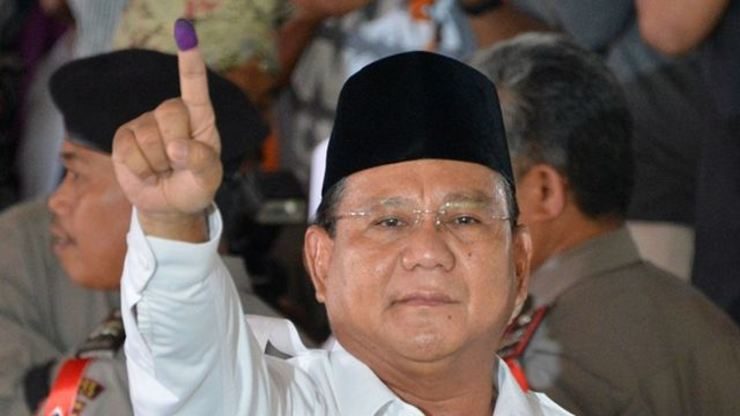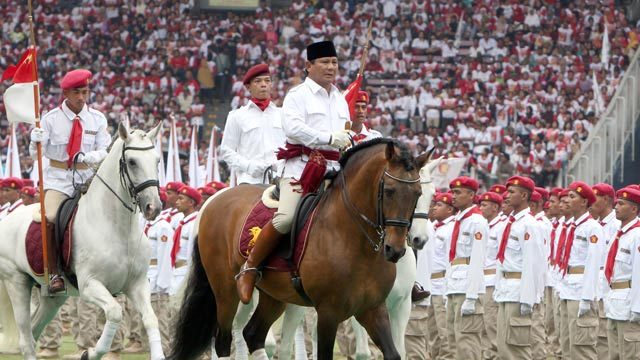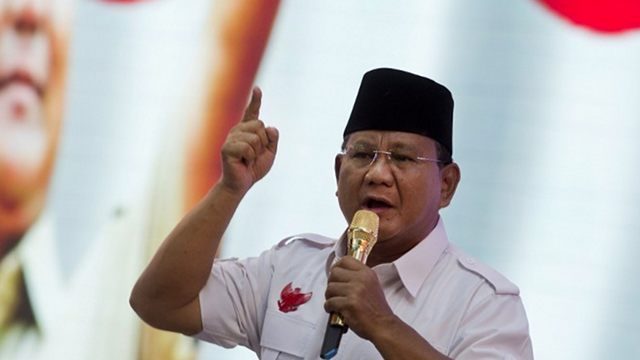SUMMARY
This is AI generated summarization, which may have errors. For context, always refer to the full article.

On July 8, 2014, the night before Indonesia’s 3rd direct presidential elections, Prabowo held an informal discussion with a small group of foreign journalists in his home in Bogor. He said he wanted to speak freely so he asked me to turn off my recorder. (Since it was unclear whether our conversation was on or off-the-record, I asked his team for approval to place my questions on the record, which I received.)
Dressed all in white, Prabowo was expansive as he answered questions in English, with some Bahasa Indonesia thrown in for emphasis.
I asked him if he considered himself a member of Indonesia’s elite. His father was a respected economist who served on the cabinets of Sukarno, Indonesia’s founding father, and Suharto, its longest serving leader. Prabowo married Suharto’s daughter, and, at one point, was considered a possible successor.
“16 years I’m out of power,” he retorted. “I fight the elite. I’m an outsider. I’m a maverick. They call me a maverick.”
I wanted to know how Prabowo looked at himself. He was obviously well-read. To answer questions, he threw out the titles of several books, including Niall Ferguson’s The Great Degeneration: How Institutions Decay and Economies Die.
“How would you define yourself?” I asked.
“My own self-image or self-perception?” he answered. “Have you ever read Paolo Coelho? Have you ever read The Warrior of the Light? I find myself in that book. If you want to understand me, then you have to read that book.”
Publisher’s Weekly describes the book as “a self-help manual with fictional overtones” – a volume of sayings and aphorisms taken from sources like Lao Tzu, Gandhi and Jesus set in a parable about good and evil and the path between.
“I was brought up as a warrior,” continued Prabowo. “To defend truth; to defend the weak; to defend the people; to uphold righteousness; to fight evil. Those are the values that have been taught to me. In the end, we have to be willing to suffer and to sacrifice our lives.”
Prabowo talked about social responsibility: “Why is it that if we want a decent life for our people, we are considered radical?”
I asked him why he scared foreign investors, quoting reports by Morgan Stanley, Deutsch Bank, and he stared me down.
“Do they know me? Did they ask me?” he responded blaming what he called a partisan media. It’s certainly true that this election may have set back Indonesian media, many of whom took sides partly dictated by owners with vested interests.
“I’m not blaming foreigners,” Prabowo added.
He focused on the economy and tried to explain why it’s alarming that Indonesia has no export surplus.
“It’s been 30 years in a row that we’ve had surplus of reserves, but we lost surplus two years ago. I’m just telling the truth,” said Prabowo. Then he turned as if addressing Indonesians: “Hey, Ladies and Gentlemen, you have nothing. You have no savings. Your country’s rich, but you’re poor.”
The questions that followed showed many in the group thought Prabowo would take drastic action like nationalizing businesses, an action feared by foreign investors.
Far from it, explained his spokesman Sandiaga Uno, one of Indonesia’s wealthiest and an advocate for young entrepreneurs. [WATCH: Why Prabowo? Sandiaga Uno talks to Rappler]
Earlier, Indonesia’s former Trade & Industry Minister (now Tourism Minister) Mari Pangestu told me the same thing, that Indonesia needs to move higher up in the value chain.
“The analogy would be we don’t want to just export garments for Calvin Klein, and we’re just doing the sewing here,” said Pangestu. “What we want to do is export fashion which has the design component or even the brand component because that’s where the higher value added comes in.” [WATCH: The Yudhoyono government in perspective]
With a confidence that borders on arrogance, it’s clear to see why few would give Prabowo the benefit of the doubt.

Dark past
Educated in West Point, the former army general was kicked out of the Indonesian military for alleged human rights violations at a crucial turning point in Indonesia’s history leading to the fall of Suharto in 1998.
Prabowo took what he claimed was decisive action and kidnapped activists “for their own protection.” But he was on the wrong side of history.
“Perhaps in different circumstances, we would be heroes,” he told Metro TV in 2008. “I would have gotten a medal.”
Instead, he was disgraced. He left Indonesia to rebuild his life and his identity, but he didn’t give up the dream of leading his nation.
When Indonesia had its first ever direct presidential elections in 2004, he ran for president – and lost. He tried again: in 2008, he set up his own political party, Gerindra, which failed to get the votes needed for him to run for president in 2009. So he ran for vice president.
Again, he lost, but he refused to give up.
Now 16 years after 1998, he comes closest to fulfilling his dream.
According to nearly all quick counts and surveys, nearly half of the 140 million Indonesians who voted on July 9 believe in him in the tightest election race Indonesia has ever had.
Except the quick counts considered credible in the past have him losing 53% vs 47%, while Prabowo cites 16 quick counts claiming he’s won.
Prabowo gave a live interview to BBC on Friday evening, July 11, that scared many Indonesians. It was clear he wasn’t going to back down.
“All of the real counts that are coming in shows that I’m leading,” said Prabowo, criticizing the counts that place his opponent, Jakarta Governor Joko Widodo, ahead.
“They are not objective, and I think they are part of this grand design to manipulate perception,” he added. “So let us rely on the legal institutions of Indonesia.”
Partly because of the satellite delay, the anchor and Prabowo frequently spoke over each other. On air, Prabowo seemed to become increasingly angry defending his cause.
“No, no, excuse me, can I finish?” continued Prabowo. “All the surveying companies you mentioned, they are commercial companies. I can bring you 16 survey companies that put me ahead.”
When his opponent’s humble bottom-up style of management was brought up, Prabowo was frank about what he thought.
“No, no, no, no, that’s a perception that the other side has concocted,” he said in the live interview. “Complete concoction. I think my rival is a product of PR campaign, completely the other side. He is actually a tool of the oligarchs, and I don’t think that’s the correct picture. He is not a man of the people. He claims to be humble, but that’s just an act.”
That visible anger, whether because of the satellite delay or because of the situation, is something else many fear.
“If Prabowo becomes president, his biggest liability, people may say, is his past, the human rights abuses allegedly,” Greg Barton told me, “but it’s actually the present and the future. It’s his temperament, which is probably tied up with those past allegations. He’s quick to get angry.” [WATCH: Stability vs Change in Indonesia]

Follow people’s will
Over the weekend, Indonesians began writing letters on a Tumblr account “Surat untuk Pak Bowo” – a letter to Mr. Prabowo. Written largely in Bahasa Indonesia and some in English, academics, novelists, journalists and ordinary citizens appealed politilely to Prabowo to “follow the will of the people.”
Now the fear of violence increases. Some analysts say this is part of Prabowo’s plans. He quickly turned it around when he was asked whether he would rein in his supporters.
“Do you know that one of the television stations that supported me, two of their stations have been attacked, vandalized,” Prabowo told BBC. “Do you know that one of the polling companies that predicted I won, they were attacked last night by a Molotov bomb? So where does the violence come from? Where does the intimidation come from?”
Both sides say they will abide by official results expected on July 22.
Reports of electoral fraud have also been filtering in, while after an initial high last week, investors are taking a wait and see attitude.
The wild card is Prabowo.
The night before elections, I asked him, “What will you do if you win?”
“Thank God,” he said then joked, “then I begin to worry!”
“And what if you lose?”
He paused.
“Democracy is democracy.” – Rappler.com
Add a comment
How does this make you feel?
There are no comments yet. Add your comment to start the conversation.